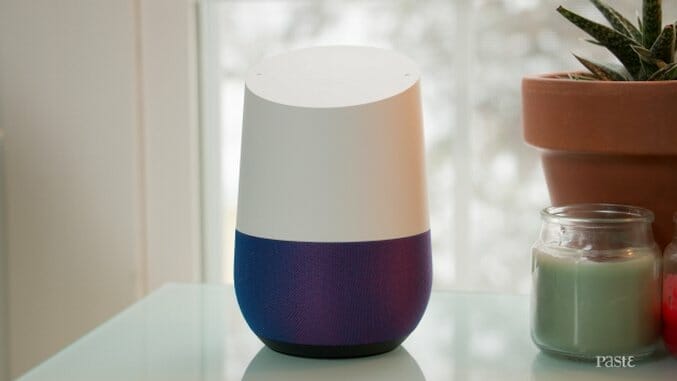5 Things Google Home Does Better Than the Amazon Echo

The Google Home and Amazon Echo have been facing off since late last year. When the Home first hit the market, it was clear it had a long way to go, particularly with third-party app support, to catch up to Alexa. Nearly a year later, the situation has evened out in many respects, but the two smart speakers still hold advantages over one another.
With a wild card soon to come in the form of Apple’s HomePod, we wanted to take a look at the original smart speakers and see how they stack up to each other, now that Google has had the better part of a year to gain some ground on Amazon. Here are five things the Google Home does better than the Amazon Echo, and be sure to check back tomorrow, when we’ll turn the tables and look at the Echo’s strengths.
Blend In There is no denying the Google Home shares a strong resemblance to an air freshener, but that actually gives it an edge over the Echo. Because of its familiarity, demure size and swappable speaker grills, the Home does a much better job of settling into the design of your home than the Echo. By comparison, Amazon’s smart speaker is a tall, imposing figure that follows you about with its light ring as you speak to it, which is more than a little spooky. The Home’s smaller size also allows for a more friendly-price, but it does mean less room for microphones (the Home only has two, whereas the Echo boasts seven), and a smaller speaker unit.
There is no denying the Google Home shares a strong resemblance to an air freshener, but that actually gives it an edge over the Echo. Because of its familiarity, demure size and swappable speaker grills, the Home does a much better job of settling into the design of your home than the Echo. By comparison, Amazon’s smart speaker is a tall, imposing figure that follows you about with its light ring as you speak to it, which is more than a little spooky. The Home’s smaller size also allows for a more friendly-price, but it does mean less room for microphones (the Home only has two, whereas the Echo boasts seven), and a smaller speaker unit.
-

-

-

-

-

-

-

-

-

-

-

-

-

-

-

-

-

-

-

-

-

-

-

-

-

-

-

-

-

-

-

-

-

-

-

-

-

-

-

-

 Both the Google Home and Amazon Echo support multiple users, but only the former can switch profiles simply by recognizing a voice. Rumors are that Amazon will add a similar feature to the Echo soon, but for now Google’s is the only connected speaker on the market with the capability. It’s not 100 percent accurate, and it can be fooled on occasion, but it should get better with time.
Both the Google Home and Amazon Echo support multiple users, but only the former can switch profiles simply by recognizing a voice. Rumors are that Amazon will add a similar feature to the Echo soon, but for now Google’s is the only connected speaker on the market with the capability. It’s not 100 percent accurate, and it can be fooled on occasion, but it should get better with time. Google Home’s support of Cast enabled devices allows users to easily set up multi-room audio with a bevy of devices, but you can still have multi-room audio even you only have multiple Homes, as opposed to secondary speakers with Google Cast. Home supports audio “groups” which allows you to pair multiple speakers, from various places in your home, into one party. Plans for a similar feature are rumored to be on the way to the Echo soon, but for now only Google’s connected speaker has the option.
Google Home’s support of Cast enabled devices allows users to easily set up multi-room audio with a bevy of devices, but you can still have multi-room audio even you only have multiple Homes, as opposed to secondary speakers with Google Cast. Home supports audio “groups” which allows you to pair multiple speakers, from various places in your home, into one party. Plans for a similar feature are rumored to be on the way to the Echo soon, but for now only Google’s connected speaker has the option.






































